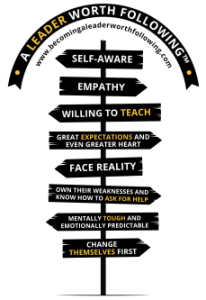In today’s rapidly evolving work environment, leadership isn’t just about managing tasks or delegating responsibilities, it’s about earning trust, inspiring others, and creating a culture people actually want to be part of. That’s why the book Becoming a Leader Worth Following carries a title that goes beyond surface-level leadership advice.
Why This Title?
While much of the book focuses on becoming a leader others enjoy working with, the title emphasizes a deeper goal: becoming a leader others want to follow, not just someone they have to follow.
At its core, Becoming a Leader Worth Following is about fostering authentic, meaningful relationships in the workplace. It’s a call to action for leaders to become the kind of people who attract loyalty and dedication, not through authority, but through trust, respect, and connection.
The Power of Voluntary Followership
In many organizations, employees follow leaders because the structure requires them to. But what if your team wanted to follow you, not out of obligation, but out of inspiration?
That’s the real power behind being a leader worth following.
When people feel seen, supported, and respected, they’re more likely to:
- Stay longer in their roles.
- Be more productive.
- Create a positive work culture.
- Deliver better results to customers and stakeholders.
On the flip side, do you want to know the number one reason people leave organizations? Poor leadership, often tied to negative experiences with supervisors.
By becoming a leader who builds trust and fosters a healthy, enjoyable work environment, you reduce friction, boost morale, and drive long-term success.
Leadership That Lasts
Becoming a Leader Worth Following isn’t just a catchy title; it’s a philosophy, one that recognizes the real human dynamics behind leadership. It’s about remembering that leadership is not just positional but it’s also relational. People follow people, not titles.
So, if you’re a leader, or aspire to be one, ask yourself: “Are people following me because they have to or because they want to?” That difference is what transforms workplaces, strengthens teams, and drives meaningful progress.



